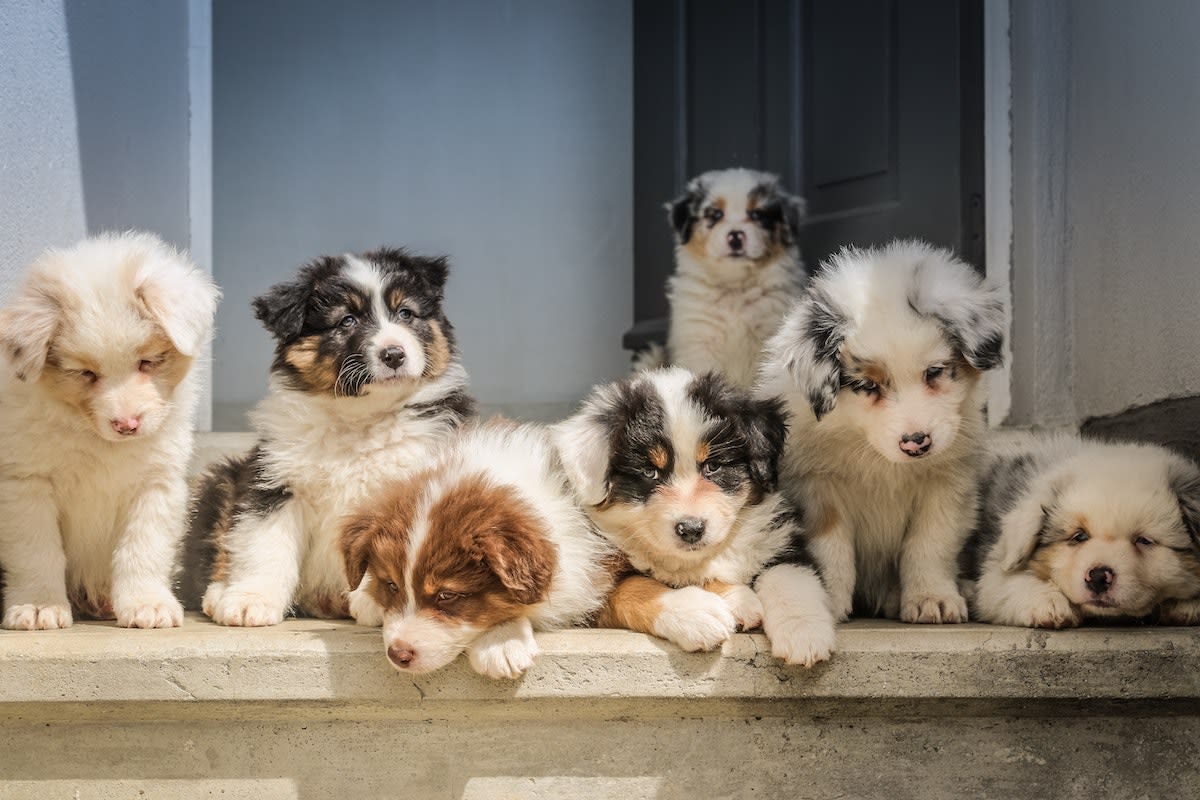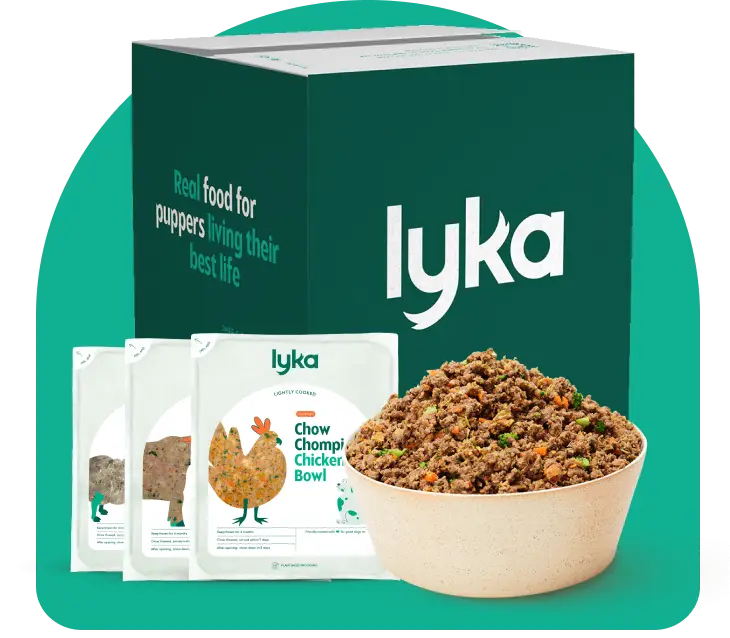Puppy farms: Why you shouldn't buy from one, and how to spot them
By Helene Mann

Every puppy deserves to go to a good home and to be loved. But though it’s hard to resist a puppy that’s just the right breed with the brindle pattern or chocolate colour you’ve always wanted, it’s also important not to support puppy farms by buying from one. Buying a puppy from a puppy farm supports their business which is not about putting dogs’ welfare first – it’s simply about making money. Not only are the poor little puppers they bring into the world at risk of behavioural and health issues, the mothers especially are treated as breeding machines, with no love or concern for their wellbeing, things that we at Lyka care passionately about.
So, what is a puppy farm?
Puppy farms (also known as puppy mills) are intensive dog breeding facilities. There are a number of reasons why they fail to meet the needs of their puppers:
The conditions in puppy farms are usually poor and don’t meet the behavioural, social and/or physiological needs of their puppies.
They usually operate on a large scale, with many litters and several breeds, however smaller operations also have inadequate conditions.
Being raised in a puppy farm can lead to long term health and behavioural issues
Why should I avoid a puppy farm?
Puppy farms are mass-production breeding facilities that aim to produce as many dogs as possible for the minimum cost, maximising the profit for the people that run them. As a result, they can feature:
Overcrowding
Unhygienic conditions
Extreme confinement
Inadequate care (including lack of veterinary attention)
Puppies raised in puppy farms can suffer long-term health and behavioural problems throughout their lives. You may think that buying from a puppy farm is rescuing a dog, but in reality, it is just incentivising the breeders to continue. If you’re keen on rescuing a dog, consider adopting one from a shelter.
How can I spot a puppy farm?

Look out for these tell-tale signs. Puppy farms have become very clever at disguising what they really are, but here are a few tips to help:
Advertised online: Puppy farms usually advertise puppies through online platforms, such as Facebook Marketplace and Gumtree, or they may sell pups at car boot sales and markets.
No access to parents: Puppy farms may prevent you from meeting the parents (especially the mother). It’s such a hard life being a mumma in a puppy farm. They are often made to breed in every heat cycle, even after just giving birth, so if they’re already pregnant you may not be allowed to see them. If you are introduced to the mother, look for signs that they’ve just given birth, such as enlarged breasts and clear protectiveness of her puppies, to ensure they are they actual mother of the puppies. Always ask to meet the parents of a puppy – a responsible breeder will introduce you.
Pups less than 8 weeks old: Cute as they are, you should never buy a pup younger than 8 weeks because separation from the mother can lead to serious developmental issues. Responsible breeders may let you meet the puppy and accept a down payment, but will never let you take them home before they turn 8 weeks.
No proof of veterinary care: Puppy farms will often cut costs by avoiding vets, so their pups miss important vaccination deadlines and can have undetected health issues. Responsible breeders will have evidence of vet visits and may have done further testing for inheritable diseases.
Signs of poor health: Dogs from puppy farms may show symptoms of poor health, such as a dull coat, poor skin condition or wounds, worms, sniffles and runny eyes, limping or coughing. If when you go to see a puppy and most of the dogs are sleeping or look lethargic, it can suggest poor attention and hygiene.
Behavioural problems: Dogs from puppy farms may have lived in isolation or missed out on being socialised. This can make them more aggressive or alternatively, shy. These pups are harder to train in the long term, and studies have shown that even as adults, they can have more difficult temperaments.
Harder to housetrain: Dogs that have lived in poor, unsanitary conditions may have overcome their natural aversion to their own faeces and urine. Therefore, pups from puppy farms often arrive with bad habits such as ‘coprophagia’ (eating their own poo) and may be harder to toilet train.
Checks: Genuine breeders can be checked. Rules differ across different states but in NSW, for example, any advertisement for a dog needs an I.D. number (a microchip number, a breeder identification number, or a rehoming organisation number). This way they can be searched in the NSW Pet Registry, or the business checked using the breeder identification number.
Genuine breeders will ask about you: A responsible breeder should ask you questions about your home and lifestyle to ensure that you are a good match for a particular dog and breed. So, how big is your back yard? How much will you walk the dog? How much time do you spend at home? These are the type of questions you can expect about your lifestyle.
They’ll also ask you to sign some paperwork, and responsible breeders will normally include a clause about being able to return the dog if you are unable or find you’re unsuitable to care for them. By law, your puppy should be microchipped when they are 12 weeks old or when sold, whichever comes first.
If in doubt, ask questions. Ask the breeder how many dog breeds they have – if it’s more than 2 or 3, it can be a sign of a puppy farmer. Multiple litters should also ring alarm bells. Some puppy farms will place a litter with a family a day or two before your appointment to fool you into thinking it’s their own dog’s puppies. So, ask them questions, and if possible, ask the children of the home as they are less likely to lie! Ask questions like, “How long have the puppies been here for?” and “How many litters has the mum produced?”
What is your gut saying? Puppy farms can be sophisticated operations and may try to make you feel like they are responsible breeders. If in doubt, try phoning a local vet to get their experienced opinion.
Where should I get a dog from instead?

Adopt!
Adopting is a great way to bring a pupper into your home. It can be a testing time training a new puppy, even from a breeder, so adopting an adult dog may be ideal for you. It can be a real joy giving an older dog a forever home and they’ll love you for it. Be aware, that adopted dogs have had a past life, which may have involved difficult experiences, and some may have very specific needs or take time to develop trust in a new family.
Responsible breeder
If you’re confident that the breeder you’ve found operates safely and responsibly, they can be a good option for you. While adoption is a great route, it isn’t for everyone, and for some people who don’t spend too much time at home, or those who have other pets or children around, a breeder may be a better way to go.
Searching for more info?
Check the RSPCA puppy guide
Oscar’s Law is an Australian anti-puppy farm organisation. You can learn more about them and donate at oscarslaw.org.
Debra Tranter, the founder of Oscar’s Law, recommends doing your research, asking the right questions, visiting where the puppy was born and seeing how it interacts with its mum and littermates.
“Any red flags or warning signs, walk away and report to authorities. Don’t reward puppy farmers with your cash; it’s simply providing them an incentive to keep doing what they are doing”
— Debra Tranter
Love your pupper with Lyka
Our puppers’ welfare is at the heart of what Lyka stands for. Nutrition is just one part of raising a healthy and happy pup and we’ve got that covered. Starting your pup on Lyka sets them on a journey through life that’s filled with love, health and happiness. See the full range at our website and order your Starter Box today.






